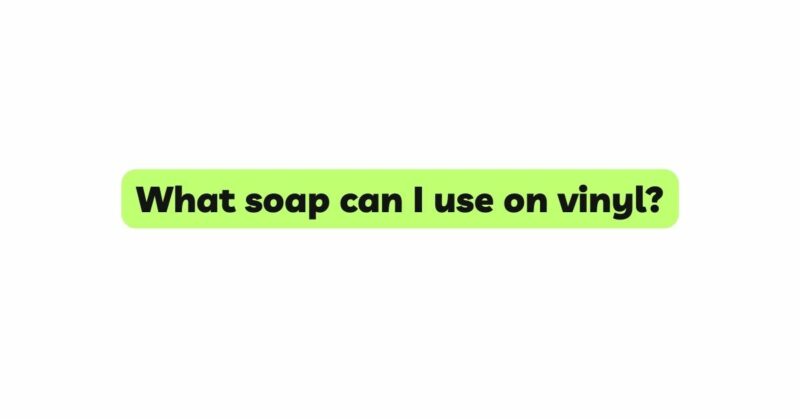Vinyl records have made a remarkable comeback in recent years, captivating music enthusiasts with their warm, authentic sound. As vinyl continues to gain popularity, it becomes crucial to understand how to properly care for these cherished artifacts. One fundamental aspect of vinyl care is cleaning, and the type of soap used in the cleaning process plays a pivotal role in preserving the records’ longevity and sound quality. In this article, we will explore the nuances of vinyl cleaning, analyze the characteristics of various soaps, and provide a comprehensive guide on choosing the best soap for your vinyl collection.
- The Importance of Proper Vinyl Cleaning
Vinyl records are delicate and prone to accumulating dust, dirt, and oils from fingers. These contaminants can cause surface noise, reduce sound quality, and potentially damage the grooves. Regular cleaning is essential to maintain the pristine condition of your vinyl collection and ensure a pleasurable listening experience. However, not all cleaning solutions are suitable for vinyl, and using the wrong soap could lead to irreversible damage.
- Understanding Vinyl Composition
Before diving into the world of vinyl cleaning, it is essential to grasp the composition of vinyl records. Vinyl records are typically made of polyvinyl chloride (PVC) combined with various additives to enhance durability and sound quality. The grooves of a vinyl record are where the magic happens, capturing the audio signals that translate into music when played on a turntable. As we explore different soap options, we must consider how they interact with the vinyl’s composition.
- The Ideal Qualities of a Vinyl-Safe Soap
When choosing a soap for vinyl cleaning, several key qualities are essential:
a. Non-Abrasive: Vinyl records are sensitive, and any abrasive substances could harm the grooves, affecting the sound quality permanently.
b. Residue-Free: Soaps leaving behind residue might attract more dust and dirt, making the cleaning process counterproductive.
c. Gentle on PVC: The chosen soap should not react chemically with PVC, as this could lead to discoloration or warping.
d. Antistatic Properties: Static electricity is a common issue with vinyl, and using a soap with antistatic properties can help minimize static buildup during cleaning.
- Types of Soaps for Vinyl Cleaning
a. Record Cleaning Solutions: Purpose-built record cleaning solutions are commercially available, specifically designed to cater to vinyl’s delicate nature. These solutions typically meet all the necessary criteria for safe vinyl cleaning, offering a gentle and effective cleaning experience.
b. Isopropyl Alcohol: Many vinyl enthusiasts use a mixture of distilled water and isopropyl alcohol for cleaning. This method can be effective for removing stubborn grime and oils, but caution should be exercised to avoid using a high concentration of alcohol, as it may cause damage over time.
c. Mild Dish Soap: Some collectors use a solution of mild dish soap and distilled water to clean their vinyl records. While this method is cost-effective, it requires careful attention to the soap’s composition to ensure it meets the vinyl-safe criteria.
d. Homemade Cleaning Solutions: Numerous DIY vinyl cleaning solutions can be found online, but these should be approached with caution. Some might be effective, while others could potentially harm the vinyl. It is crucial to thoroughly research and test any homemade solutions before applying them to your precious records.
- Proper Vinyl Cleaning Techniques
Using the right soap is only one aspect of effective vinyl cleaning. Equally important is the cleaning technique. Here are some tips to ensure a safe and efficient cleaning process:
a. Use a Soft Brush: A soft, anti-static brush is the best tool for removing loose dust and debris from the record’s surface before cleaning.
b. Gentle Circular Motions: When applying the soap solution, use gentle circular motions, following the grooves’ direction. Avoid applying excessive pressure.
c. Rinse Thoroughly: After cleaning, rinse the record with distilled water to remove any soap residue.
d. Air Drying: Allow the vinyl record to air dry naturally, using a drying rack or stand to prevent contact with surfaces that may introduce new contaminants.
- Storage and Maintenance
Cleaning is not a one-time process. Proper storage and maintenance are critical to ensuring the longevity of your vinyl records. Invest in inner and outer sleeves to protect the records from dust, and store them vertically to prevent warping.
Conclusion
Taking care of your vinyl records goes beyond mere aesthetic purposes; it ensures the longevity and preservation of these cherished musical artifacts. When choosing a soap for vinyl cleaning, opt for options that prioritize safety and gentleness over aggressive cleaning. By following proper cleaning techniques and maintenance, you can continue to enjoy the warm, authentic sound of vinyl for years to come. Remember, a little care and attention can go a long way in preserving the magic of vinyl records for generations.


